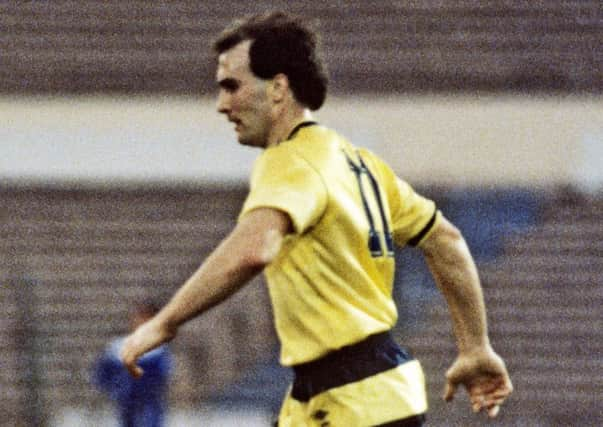Fergie sent us to bed: Eamonn Bannon on Scots' 1986 Israel win


He duly slapped a ban on sightseeing: The Wailing Wall would have to wait.
It was January 1986 yet still hot and humid. Scotland were aiming for a second successive victory in Israel: a World Cup qualifier five years earlier and now this, a warm-up for the next World Cup finals in Mexico. It was serious business. The wishes of Bannon and other intrepid teammates to have a look around fell on deaf ears.
Advertisement
Hide AdAdvertisement
Hide AdWe’ll be back, Fergie may have reasoned. He has been – with Manchester United. But Scotland haven’t – until tonight. Bannon is still due to return.
The midfielder was called back into the squad after a lengthy absence. His omission was beginning to attract comment since he was continuing his good form for a Dundee United team continuing to excel both at home and abroad.
“The trip I really wanted to go on, because I was being touted for a call-up, was the one before to Australia because of my brothers, but I wasn’t picked,” Bannon recalls.
His three brothers – Paddy, Vince and Ged – all emigrated to the other side of the world, two of them to play football. One, Vince, was even close to being called up by Australia for the 1974 World Cup.
Scotland, meanwhile, was still mourning Jock Stein’s death. Ferguson, pictured below, stepped into the breach but did not start leaving his own imprint on the squad until after the play-off victory over Australia. Bannnon got the call for Israel – a game too late as far as the hope of an all-expenses paid trip to Australia to see the brothers Bannon was concerned.
But he made the most of a belated return to the fold in what was his first appearance since scoring in a 2-1 defeat against East Germany just over two years earlier. He made his debut as far back as 1979 against Belgium and ended up winning 11 caps spaced out across seven years. “I must have done OK v Israel,” he recalls. “I got into the 40 and then final 22 for the World Cup. It was a late run into the box.”
His memories of the game itself are sketchy. A second-half goal from Paul McStay earned victory for Scotland, who were playing in yellow shirts and blue shorts with a distinctive yellow band across them. Only 9,000 turned up in the 50,000-capacity stadium.
“I remember the security at the airport being huge even considering it was pre-9/11 days,” says Bannon. “We got stopped about three miles from the airport, soldiers came on searched the bus. Then you got to the airport and every person was sent to an individual security guard and they searched your bags, obviously looking for bombs. It was unheard of at the time.”
Advertisement
Hide AdAdvertisement
Hide AdThere was an uneasy atmosphere. Ferguson did not want the players straying too far from their hotel. As in 1981, the game was played in the outskirts of Tel Aviv at the Ramat Gan stadium, now largely abandoned in terms of hosting significant football matches.
“I wanted to go to Jerusalem to see the Temple Mount and the Wailing Wall but Fergie wouldn’t let us go, he sent us to bed instead,” recalls Bannon, who now runs a guest house in Edinburgh catering mostly for tourists whose movements, fortunately for them, don’t rely on Ferguson’s say so.
“I’ve not been back,” adds Bannon, who turned 60 earlier this year. “But I promised myself I would go back. One day…”
Bannon did get to see some of Mexico on account of a good showing in Israel.
These were bleak circumstances in view of Stein’s death but Ferguson was always more likely to consider those who played for the likes of Dundee United and, of course, Aberdeen. By full-time in Israel there were five Dundee United players on the pitch and three from Aberdeen.
Bannon, Maurice Malpas, David Narey and Richard Gough all started while Paul Sturrock replaced Graeme Sharp in the second half. The Pittodrie contingent was made up of Jim Leighton, Willie Miller and Jim Bett.
“The big thing for me was Fergie was a big fan of mine,” explains Bannon. “As Aberdeen manager, he had seen a lot of me. Jock Stein quite liked me but he was not as sure about me as Fergie. Jock died and Fergie was maybe looking for a different balance and for a left-sided player.
“He had seen me a lot while Jock Stein was basically based in Glasgow,” he continues. “There was absolutely no doubt about it, if you played for Celtic or Rangers you were much more likely to get a cap than if you played for Dundee United. I was along for the ride. I was quite happy. I was just delighted to be there. I was definitely fringe but managed to get in and ended up playing in a World Cup.”
Advertisement
Hide AdAdvertisement
Hide AdBannon appeared twice in Mexico, coming on against Denmark and then starting the middle group game against West Germany. It was his last cap.
“A lot of the Aberdeen and United players went to the World Cup,” he says. “That was the start of that change. But to be honest it took a long time. Obviously we were all good players just playing for the so-called wrong club. Now it’s the other way around – all the good players are playing for Celtic and Rangers. Back then it was almost as if people could not believe there were good players playing for other clubs.”